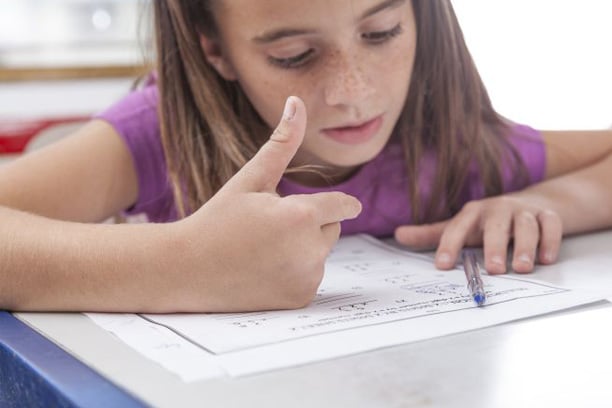Dyscalculia
How can the tutors support children
with Dyscalculia?
Dyscalculia is a condition that affects ability to acquire and utilise arithmetical and mathematical skills. As well as referring to difficulties in hitting expected maths targets specific to different ages, the condition can impact in various ways in daily life – for example, time-keeping or money.
Though it does not reflect any general deficit in a child’s cognitive abilities, the DFES’s National Numeracy Strategy highlights some specific challenges that can be faced by those with dyscalculia.
A child may struggle to understand simple number concepts, or have problems learning number facts and procedures. And even if someone with dyscalculia produces a correct answer, they may not understand how they did it – or gain confidence from getting the right answer.
Prevalence
Though research has been limited, experts estimated somewhere between 3-7% of school age children may have dyscalculia. It’s also currently thought that dyscalculia occurs equally in both genders. It can also occur in combination with other difficulties – a 2015 study, for example, suggested that 11% of children with dyscalculia also have ADHD.
Not all struggles with maths – even serious ones – are due to dyscalculia, however. Other conditions can affect a child’s ability to work out maths problems – such as dyslexia, visual or auditory processing problems, or ADHD.
"David is the best maths teacher we have ever known. He is able to engage our son in maths, when in the past nobody else has. He’s made him more confident as well as giving him new skills. My son has even said he enjoy maths with David - a small miracle! The school have noticed a huge improvement in attitude to learning and ability too. All together excellent! Highly recommended."
Charlotte, A’s mother, London
Possible signs of Dyscalculia
A young person with dyscalculia may exhibit different problems at different ages.
For younger children, those may include:
- Difficulty recognizing numbers;
- Delays in learning to count;
- Struggling to connect numerical symbols with corresponding words (e.g. 5 to five);
- Difficulty recognizing patterns and placing things in order;
- Losing track when counting;
Older children, meanwhile, may show some of the following signs:
- Significant difficulty grasping basic functions like addition and subtraction, as well as learning simple times tables;
- Difficulty estimating time – such as how long it may take to complete a task;
- Struggling to process visual-spatial things like graphs and charts;


How is Dyscalculia diagnosed?
There is at present no specific test for dyscalculia, as the condition is difficult to identify via a single test. Diagnosis and assessment therefore tends to rely on a range of investigations that can hone in on dyscalculia as the underlying reason for a child struggling with numbers.
One particular test used in diagnosis is the Feifer Assessment of Mathematics. This investigates three core elements of maths knowledge to determine whether or not an individual may be at risk of dyscalculia.
Helping a child with Dyscalculia
Each child may suffer from different forms of dyscalculia, which makes a tailormade tutoring programme the bedrock for providing the best support.
There are, however, a few other tools available which can provide additional help. One of the best known is The Number Race, an adaptive computer game for remediation of dyscalculia. A list of other apps that may help those with dyscalculia can be found here. The British Dyslexia Association have also published a pamphlet with links to research and resources for dyscalculia.
"Difficult to know where to start with this review as I am convinced that Obeng is an angel! From the very first lesson, he found some way of tapping into Gabriella’s personality. Her confidence and ability have gone from strength to strength. This is a child who was frightened of the very mention of the word ‘maths’. Sometimes when I observe their sessions, I can hardly believe this is the same child. Thank you Obeng, for igniting the fire in my special little girl!"
Tricia, mother of Gabriella, London
Tutor Spotlight

Kelly is a qualified teacher with over 17 years of experience in SEN home education and learning. Extensive experience providing a supportive environment, working with SEN and additional needs. She was recently awarded the runner up award at the Tutor Association’s National Awards 2023: Special Educational Needs Tutor category.
Kelly believes that: “Learning is a passion that I aim to share with my students. I enjoy finding solutions to existing problems and thinking outside the box. Creativity is the key to breaking down barriers to learning.”
Kelly’s experience working with children and young people with dyscalculia: “I have worked with a number of children both in formal school settings and on a one to one basis at home or online to support their acquisition of mathematical concepts.
From leading group sessions to enhance in school provision for dyscalculia to supporting students facing exams, I have experience providing the strategies to enable my students to develop their confidence and understanding.”
Kelly reflects on her approach when working with children with dyscalculia:
“Often my students with dyscalculia have had a rocky path to diagnosis and are disenchanted with maths in general. I aim to foster confidence and bring back the enjoyment of mathematics. I start with sharing a number of fun activities linked to mathematical knowledge and slowly work upon core concepts enhancing understanding of basic principles. I keep sessions interactive and relevant to my students’ individual interests. I watch the student in action and share patterns that can support learning. It is important to show empathy to difficulties in short term memory lapses and I aim to engineer opportunities for success and achievement. Repetition is key without relying on rote learning for successful progression in concepts.”
Kelly’s top tips for parents/carers with children with dyscalculia:
- Bring maths concepts alive with practical examples. For example using money, weighing and measuring for recipes and counting items in a meaningful manner;
- Repetition is key, repeat key concepts in a number of different situations, revisiting the original ideas and showing links between prior knowledge;
- visualise ideas using diagrams and concrete materials to model the mathematical concepts;
- Use multi-sensory tools to teach and revisit new ideas;
- Most importantly, show patience and understand reluctance and task avoidance around maths takes time and understanding to support.
Tutor Spotlight
Ewa is a passionate dyscalculia and dyslexia teacher with a Postgraduate Diploma in Specific
Learning Difficulties (dyslexia, dyspraxia, dyscalculia), and 15 years of wide teaching and leading experience in coordinating provision for students with autism (ELKLAN qualified), specific learning difficulties (dyslexia, dyspraxia, dyscalculia), speech and language, social and emotional difficulties (anxiety, ADHD).

Ewa’s experience working with children and young people with dyscalculia: “Working with students aged 5 to 16 as a specialist SEN teacher, following the maths curriculum in both state and private sectors across the UK, I have built up a range of life-based and adaptable resources to support dyscalculia and maths-related difficulties. Since dyscalculia is associated with poor number sense and the ability to subitise, I use some specific interventions and an approach: “concrete- visual- abstract” for the younger students to tackle maths challenges (e. g. Numicon, Cuisenaire rods, beads). The intervention usually is two-fold, especially with secondary students: bridging the gaps of more basic skills on one hand, and adapting their current curriculum by bringing concrete resources and graphic organisers to break down higher-level tasks (e.g. algebra tiles). With older students, we additionally focus on strategic planning ahead of their 13+/GCSE exams, supporting their motivation and metacognition at the same time.”
Ewa reflects on her approach when working with children with dyscalculia:
“Approximately 6% of the British population suffers from Dyscalculia and a high proportion of students struggling to pass GCSE in Maths. The impact of dyscalculia as a barrier to learning varies in degree according to the learning and teaching environment, making it easy to assume that early intervention is key and that dyscalculic students are more likely to suffer from anxiety and poor self-esteem.
My approach therefore is for the child to experience success in Maths. A robust initial assessment usually paves the way to planning a multi-sensory (also interactive), structured and cumulative long-term plan, where I choose to play to their strengths, being it drama, history, cookery or sports and making maths a fun, interactive experience.
Making a cake to practise proportions, a bracelet to practise sequencing, and measuring their body to estimate the amount of fabric needed, visualising famous battles to tackle ratio problems is usually better received than just a classic pen and paper.”
Ewa’s top tips for parents/carers with children with dyscalculia:
- Dyscalculia can cause high levels of anxiety. Be patient and consistent.
- Early diagnosis and intervention are advantageous.
- Little and often gives better outcomes.
- Focus on the strengths of your child.
- Make maths-related tasks a pleasant and fun experience- be it a visit to a football club, or the Science Museum, preparing a favourite meal together or measuring your garden ahead of planting seeds.
- Use manipulatives and real-life examples whenever possible.
- Show them how maths helps you, and the people your child admires, in work and life.
- Appreciate their efforts, not just successes.
- Build up their intrinsic motivation to maths by their choice of topics or taking part in maths-related competitions, e.g. playing darts, or designing a maths game online (which you will try, of course!).
- Celebrate any school numeracy-related achievement at home.




